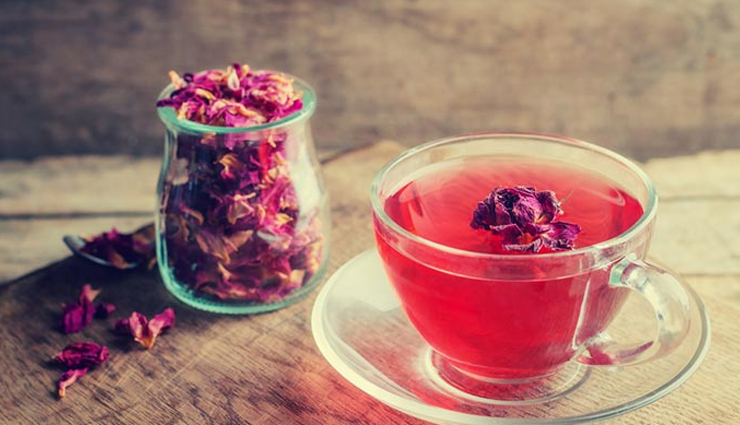- Home›
- Healthy Living›
- 8 Potential Health Benefits Of Drinking Rose Tea
8 Potential Health Benefits Of Drinking Rose Tea
By: Priyanka Maheshwari Wed, 04 Oct 2023 6:55:58

The enticing benefits of rose tea are sure to leave you yearning for a cup or two. This warm beverage is crafted from dried rose petals and floral buds, and it has gained popularity for its therapeutic attributes.
Rich in phytochemicals, rose tea offers a plethora of health advantages. Research indicates that it may alleviate menstrual discomfort, offer stress alleviation, enhance digestive health, reduce anxiety, induce relaxation, and contribute to diabetes management.
In this article, we delve into the inherent advantages of rose tea, explore its nutritional composition, and address potential side effects. Continue reading to uncover more about this natural elixir.

What Is Rose Tea?
Rose tea is a warm infusion crafted from dried petals and buds of Rosa damascena. It's important to note that it differs from rosehip tea, although rose hips are occasionally incorporated into the blend. Various cultivars of roses contribute to the creation of this fragrant tea.
Research has indicated that water extracts from rose flowers possess anti-inflammatory and analgesic properties, promoting optimal hydration within the body. These effects are likely attributed to the bioactive components inherent in rose flowers. In the upcoming section, we will explore these benefits in depth and examine the findings from relevant research studies.
Benefits Of Drinking Rose Tea

Enhancing Menstrual Well-being
Menstrual cramps pose significant challenges for many women. Studies indicate that nearly half of female adolescents experience decreased academic performance, limited sports participation, and reduced social interactions due to menstrual cramps.
In traditional medicine, rose tea and its extracts have been utilized to alleviate menstrual pain and dysmenorrhea. A study involving 130 girls was conducted to explore this effect. The experimental group was provided with rose tea to consume, and data were collected at intervals of one, three, and six months into the study.
The outcomes revealed that the girls who consumed rose tea reported reduced pain, anxiety, and discomfort during menstruation. Consequently, beverages like rose tea emerge as a potentially safe and straightforward remedy for dysmenorrhea and premenstrual syndrome (PMS).

Enhancing Digestive Health and Alleviating Constipation
Traditionally, rose petals have been harnessed in folk medicine to address digestive ailments, providing relief from stomach issues. In Syrian, Lebanese, Assyrian, and rural Middle Eastern cultures, rose-based beverages like Zhourat are popular. These drinks incorporate rosebuds, flowers, or extract drops, contributing to their digestive health properties. Including elements like Rosa damascena petals, buds, or oil amplifies the antioxidant capacity of these beverages, linking them to improved digestion.
In Iranian alternative medicine, a rose decoction is employed as a natural laxative. Notably, Gol-e-Ghand Majoon, a traditional medicinal product infused with roses, is prescribed to combat constipation. Studies conducted on rats demonstrated the significant laxative effects of boiled extracts from Rosa damascena. These extracts increased fecal water content and defecation frequency, potentially by stimulating intestinal fluid movement. Thus, the consumption of rose tea may positively impact digestive well-being and provide relief from constipation.

# Assisting in Weight Management
Scientific studies have consistently associated elevated inflammation levels with weight gain. Notably, rose tea has demonstrated anti-inflammatory properties, suggesting its potential in aiding weight loss efforts.
Unlike everyday beverages such as tea and coffee, which typically contain caffeine, rose petal infusion is entirely caffeine-free. This characteristic makes rose tea an excellent substitute for your regular caffeinated drinks, promoting overall well-being.
Rose tea is believed to support the body's detoxification process. While scientific research on this aspect is limited, anecdotal evidence hints that consuming 4 to 5 cups of rose tea might aid weight loss. This effect could be attributed to water-induced thermogenesis, although further comprehensive research is needed to substantiate these claims.

# Assisting in Diabetes Management
In animal studies, the consumption of an alcohol extract derived from Rosa damascena showcased anti-diabetic properties by lowering blood glucose levels. This specific rose species is believed to be a robust inhibitor of alpha-glucosidase, a crucial enzyme in glucose metabolism.
Rose extracts are effective in hindering carbohydrate absorption from the small intestine. This action results in a reduction in postprandial (post-meal) glucose levels, contributing to diabetes control. Additionally, rose tea is abundant in polyphenols, compounds recognized for their ability to diminish the risk of diabetes and cardiovascular diseases. These findings highlight the potential of rose tea in managing diabetes and promoting overall health.

# Easing Anxiety and Alleviating Pain
Indulging in a cup of rose tea could provide relief from stress and anxiety, courtesy of its anti-inflammatory components. The Rosa damascena species, in particular, is recognized for its analgesic properties, contributing to pain relief.
Furthermore, rose aromatherapy has demonstrated mood-enhancing effects and improved sleep quality. Research conducted on sleep-deprived rats revealed that Rose extract (Rosa rugosa Thunb) effectively counteracted sleep deprivation by inhibiting specific receptors. This therapeutic action extends to easing symptoms of depression, grief, tension, and pain, making rose-related remedies a promising option for emotional well-being.

# Promoting Hair Growth Naturally
Rose petals, particularly those from white and pink roses, boast remarkable antioxidant and anti-allergic properties. A study conducted in South Korea revealed that white rose petals effectively reduced lipid and protein oxidation in hair cells.
Rose phytochemicals have the ability to curb sebum secretion, a factor linked to preventing itchy and oily scalp issues. When incorporated into hair products such as shampoos, rose extracts from various species can aid in reducing scalp inflammation.
Additionally, compounds like ellagitannin and epigallocatechin gallate present in rose petals act as preventive measures against hair loss and conditions like seborrheic dermatitis. Consequently, the consumption of rose tea or the topical application of its extracts holds the potential to treat scalp inflammation and hair fall naturally.

# Assisting in Lowering Cancer Risk
Rose petals have undergone extensive research due to their cytotoxic and antioxidant properties. Additionally, they have been identified to possess anti-mutagenic characteristics.
Rose tea is abundant in antioxidants, which play a crucial role in neutralizing free radicals generated during oxidative stress. Uncontrolled oxidative stress might elevate the risk of chronic systemic illnesses, including cancer. These free radicals, resulting from oxidative stress, can inflict cellular damage by mutating the DNA.
# Exhibiting Antimicrobial Properties
Specific varieties of roses have been meticulously examined for their antimicrobial attributes. The presence of flavonoids, tannins, phenolic acids, and carotenoids in rose petals underpins their antimicrobial effects.
Studies have demonstrated that rose petals exhibit inhibitory effects against various bacterial strains, including Staphylococcus epidermidis, S. aureus, Bacillus subtilis, Micrococcus luteus, Escherichia coli, Klebsiella pneumoniae, Pseudomonas aeruginosa, and Proteus mirabilis. Furthermore, they have shown the ability to impede the growth of certain yeast species.
These advantageous properties are attributed to the phytochemical composition of rose petals, which encompasses anti-inflammatory, antioxidant, and analgesic agents found in rose tea.
What Are The Phytochemicals In Rose Tea?
The rose plant encompasses an array of compounds, including terpenes, glycosides, flavonoids, anthocyanins, carboxylic acids, as well as various simple and complex organic compounds. Its flowers contain myrcene, kaempferol, quercetin, tannins, and fatty oils. Notably, the essential oil of roses houses a significant portion of the flavonoids.
In-depth biochemical analyses have indicated that the phenolic compound content in most rose tea species matches or surpasses that found in green tea. Gallic acid, a component detected in teas derived from various rose cultivars, is deemed the primary contributor to the beverage's potent antioxidant properties.
Anthocyanins, a group of phytochemicals responsible for the vibrant color of rose petals, actively eliminate free radicals in the body. These pigments, in conjunction with phenolic acids and tannins, amplify the medicinal value of rose tea.
This tea has been proven to possess a higher antioxidant potential than both green and black teas. Its natural sweetness or neutral taste is attributed to the polysaccharides it contains.
For those eager to prepare rose tea, worry not—we've got you covered. Below is a straightforward recipe for brewing rose tea, ensuring you enjoy its holistic benefits. Whether you use fresh or dried rose petals, the process remains the same.
How To Make Rose Tea At Home

Ingredients
Dried rose petals (2 teaspoons)
Hot water (1 cup)
Optional: Honey or your preferred sweetener
Optional: Fresh lemon slices for a citrusy twist
Method
- Begin by choosing high-quality dried rose petals. Organic or culinary-grade petals are ideal for the freshest flavor and maximum health benefits.
- Heat the water to just below boiling point, around 95°C (200°F). Pour this hot water into a teapot or a heat-resistant glass.
- Place the dried rose petals into the teapot or glass. One to two teaspoons of petals per cup should suffice, but adjust according to your taste preference for a stronger or milder flavor.
- Cover the teapot or glass to preserve the aroma. Let the rose petals steep in the hot water for about 5 to 7 minutes. This allows the petals to release their essential oils and flavor into the water.
- Sweetener: If you prefer your tea sweet, add honey, agave syrup, or any other sweetener of your choice. Stir gently until it dissolves.
- Citrusy Twist: Enhance the flavor with a few fresh lemon slices. Lemon complements the floral notes of the rose petals beautifully.
- After steeping, strain the tea to remove the petals. Pour the fragrant rose tea into your favorite teacup or mug.
- Take a moment to appreciate the delightful aroma as you sip your homemade rose tea. Feel free to garnish with a fresh rose petal for a touch of elegance.
What's the Appropriate Daily Intake of Rose Tea?
Moderation is essential when indulging in this herbal infusion. While specific quantitative studies regarding the upper limit of rose tea consumption are lacking, it is advisable to limit your intake to no more than 5 cups per day. Excessive consumption may lead to potential side effects.
Potential Side Effects of Rose Tea
Anecdotal evidence suggests that overconsumption of rose tea might result in nausea or diarrhea. It's worth noting that rose extracts are generally considered safe by the FDA (18). However, if you have food sensitivities, it's prudent to consult your doctor before incorporating rose tea into your diet.





